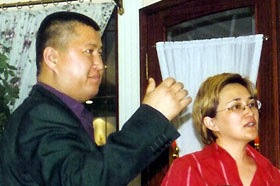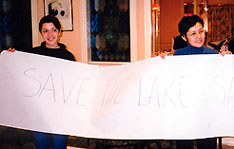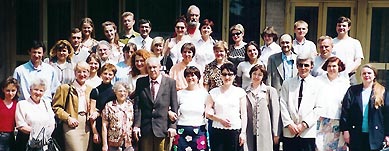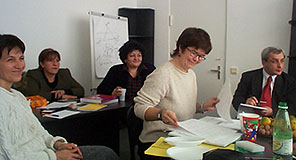| |
- Click here to download the latest edition of Out Loud Snapshots, Hamlet's quarterly newsletter. (Adobe Acrobat Reader needed: if you do not have Acrobat Reader click here to download it.) For full details of back issues go to our Publications page.
|
Partnership with Pharmaceutical Companies: policy position announced
The Hamlet Board of Trustees has recently approved a policy paper detailing guidelines for working with pharmaceutical companies. Hamlet is beginning to develop relationships with pharmaceutical companies, with a view to accessing both funding and wider networks, but we consider that any partnership should be carefully considered to ensure it is in Hamlet's interests.
To read the a Word document version of the paper click here. Hamlet Network Member Organisations are welcome to adapt the policy paper for their own use if they so wish.
Hamlet Policy Conference presses World Health Organisation into action
Over 100 mental health stakeholders, including many service users, attended Hamletís recent Rethinking Mental Health Policy conference in Slovenia. Many took the opportunity to lobby the World Health Organisation (WHO) to recognise the voice of users as an integral element in the shaping of mental health policy. Delegates sent special postcards featuring the conference logo to senior figures in the mental health departments of WHO in Denmark and Switzerland.
This raised awareness of the views and grass-roots experiences of people with mental health problems: the proactive sharing of life stories and experiences has already had a positive impact.
One of the recipients of those postcards was the Acting Regional Advisor for Mental Health Dr Matt Muijen. Dr Muijen subsequently invited Hamlet Trust to meet with health ministers and other high-level decision-makers and NGOs from throughout Europe in January 2005 in Helsinki, Finland, at the WHO European Ministerial Conference on Mental Health. At the Conference, ministers endorsed a mental health declaration and an action plan for Europe.
These are expected to drive policy on mental health in the WHO European Region for at least the next five years.Jane Shears, Hamletís representative at the meeting, said ďEveryone present at the meeting recognised it was invaluable to have a forum such as this for useful dialogue between the NGOs and the WHOĒ. Hamletís significant influence on the WHO has helped to establish the voice of user-led NGOs are represented.
 Walls come tumbling down
Walls come tumbling down
"During the course of just 3 to 4 forums, I have changed my views about mental health by 80%". So said Dr Janibek Ajybekov, chief psychiatrist at Chim Korgon Psychiatric Hospital, Bishkek, Kyrgyz Republic. He was speaking about the meetings of the forum set up in Bishkek as part of Hamletís Pathways to Policy (P2P) programme. Janibek was participating at the P2P International Policy Workshop held in early February in Turkey, bringing together 25 participants from 5 countries to review the successes of the first year of the programme (the 2nd year for the Estonian forum) and to make plans for the next year.
Janibekís story is similar to those in the other 4 countries, Estonia, Armenia, Bosnia-Herzegovina and Romania, where decision makers and medical professionals have been coming together with family members and service users to discuss tactics for improving the lives of people with mental health problems, to influence legislation and raise awareness amongst the general public. Trust has been built and people who would rarely come into contact in such an environment are now working to achieve common goals. "I had internal conflicts for some time," said Janibek, "but now I understand, support and work towards the aims of the forum".
The workshop provided an opportunity for members of the forums, whatever their background, to learn new skills and share their experiences. Kristi, a member of the forum in Tallinn, Estonia, said "We learnt how much the Local Policy Forum can change the life of the service user." Getting local business and the media was also found to be a vital way to involve the local community, change perceptions, and to help ensure the sustainability of forums beyond 2004.
Remembering Edith Morgan
Edith Morgan, a leading campaigner in the world of mental health and a member of the Hamlet Trust Board of Trustees, passed away in August last year. Hamlet Director Jo Lucas gives a personal tribute to her. Click here
|
|
Training for Trainers Pack is Published
Hamlet is pleased to announce that the training for trainers pack, developed as part of the Developing Network Partnerships project (1999-2001) has been published in the UK by Pavilion Publishing. The pack takes exercises and activities from the Hamlet training for training workshops to enable users of mental health services to become trainers and facilitators.
Anyone interested in purchasing a copy of the pack should contact Pavilion Publishing at their website at www.pavpub.com.
|
|
Pathways to Policy focus Ė a workshop participant reports
Burul Makenbaeva from the Kyrgyz Republic, a Local Policy Co-ordinator (LPC) on Hamletís Pathways to Policy programme, recently met up with other LPCs in Istanbul, Turkey, to share experiences, ideas and plans for the future.
"The workshop in Istanbul provided an opportunity to meet with like-minded persons to study different initiatives in mental health in Romania, Bosnia and Estonia.
|
|

Burul Makenbaeva (right) with Mihaela Tanasan from Romania during a campaigning exercise at the workshop in Istanbul
|
"Learning about the Estonian experience on advocacy of mental service users was very helpful for us, a learning experience that started when Pille Ilves from EPE (Estonian Patients' Advocacy Association) came to our country in June 2002. We have plans to establish a service for the protection of the rights of patients of psychiatric hospitals as it is in Estonia. Piret Kokk, a participant of Istanbul workshop, told us about how the Pathways to Policy Programme is beginning to speed up in Estonia.
I was impressed by the presentation of Halida Vejzagic from Bosnia. She told us about the usersí association that includes seven usersí groups. The association will have an effect on mental health policy on a national level.
The experience of Romanian group Orizonturi brings hope to my heart. In the small town of Campulung-Moldovenesc in a picturesque part of Romania a group of mental heath service users are successfully working in cooperation with various sections of the local community, including the mental health hospital, priests, the army and a tourist company.
The majority of of people in my country, Kyrgyz Republic, live in rural areas. The problems are that most mental health services and resources are concentrated in the capital Bishkek. The Romanian experience would be a very useful model for improving mental health services in Kyrgyz Republic.
The atmosphere of workshop was very warm and friendly. I felt as if the participants, trainers from Hamlet Trust and the staff of the hotel the whole week lived as the members of one family."
Back to top
Renovation work in Ukraine
Soyuz Druzey (Friendsí Union), a Hamlet Network Member Organisation in Kyiv, Ukraine, will be the focus for a new project being funded by the European Unionís Institution Building Partnership Programme (IBPP).
| |

The IBPP Forum Group in Kyiv
|
| |
|
In early 2002 Soyuz Druzey, together with its sister organistaion, Agenstvo Spryiannia Socialnomu Rosvytku (ASSR, Social Development Support Agency), piloted a project which has seen users of mental health services learn skills in renovating and decorating flats. Having transformed their own homes and those of their friends, the new funding will enable users to turn the experiment into a fully-fledged employment project, with participants able to earn an income using their newly-acquired skills. Another aspect of the IBPP project will be the development of self-help groups in other cities in Ukraine, including Kharkiv, Lviv, Vinnitsa, Chernigiv, Odessa and Donetsk, facilitated by ASSR.
|
 In January 2003 a conference was held in Brussels, Belgium marking the beginning of 72 IBPP projects in countries of the former Soviet Union and Mongolia. Olga Vasylchenko from ASSR and Jonathan Bureau from Hamlet Trust attended the event, where a series of workshops were held, providing an opportunity to exchange and develop ideas and strategies on project management.
In January 2003 a conference was held in Brussels, Belgium marking the beginning of 72 IBPP projects in countries of the former Soviet Union and Mongolia. Olga Vasylchenko from ASSR and Jonathan Bureau from Hamlet Trust attended the event, where a series of workshops were held, providing an opportunity to exchange and develop ideas and strategies on project management.
Back to top
A new programme begins in Georgia
In November 2002 Hamlet Trust Director Jo Lucas spent a week in Georgia with Ella Terburg from Geneva Initiative on Psychiatry (GIP) and Simon Surguladze, a London-based Georgian psychiatrist, to announce the opening of a two-year programme.
|
|

Jo Lucas and the GIP-GAMH team getting down to business
|
This programme, funded by CORDAID (Netherlands) and Miserior (Germany), is designed to support the development of NGOs and their services. It will also aim to reform psychiatric services through training professionals and supporting the Georgian Ministry of Health in developing a more effective policy infrastructure.
Small grants will enable 6 Network Members to develop a range of activities including
- Developing the policy template that is part of the World Health Organisation Country Profiling process.
- Developing new ways of working with older people with mental health problems living at home.
- Developing a media and information campaign for young people on drug and alcohol issues.
- Training doctors in mental health issues
- Enabling the user group to develop a number of employment opportunities.
- Taking the advocacy project into other regions of the country and looking at supporting people and their families at home.
In addition the programme will be offering two short training courses, one on social work teaching and methodology and the other for professionals already working in the field, especially nurses and doctors.
A conference was organised by the Georgian Association for Mental Health (GAMH) which was attended by a wide range of professionals, at least one user, and representatives of the Ministry of Health. This event was a great achievement for GAMH, as it was the first truly interdisciplinary public conference to be held in Georgia and was a great step forward.
Back to top
|
|